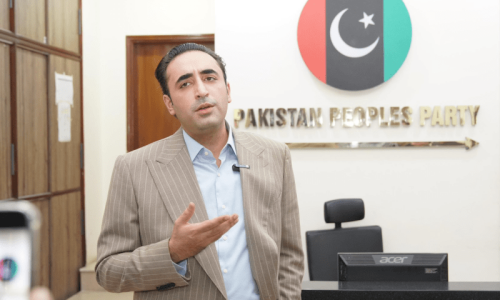 NEW DELHI, Jan 17: Pakistan and India began their third round of composite dialogue here on Tuesday reasonably pleased with the gains from their outings so far, but watchful of what Islamabad believes to be the toughest challenge ahead — unravelling the Gordian knot of Kashmir.
NEW DELHI, Jan 17: Pakistan and India began their third round of composite dialogue here on Tuesday reasonably pleased with the gains from their outings so far, but watchful of what Islamabad believes to be the toughest challenge ahead — unravelling the Gordian knot of Kashmir.
The outcome on the first day included a promise to consider important steps to bring down nuclear risks — both accidental and unauthorised — between the two as well as conventional security proposals one of which aims to keep each country’s strike corps safely away from forward positions.
Before the talks, two incidents had initially worried the Pakistanis. India’s statement over the military operations in Balochistan and the killing of the alleged Pakistan-linked mastermind of the notorious Delhi blasts by Indian security forces in Kashmir earlier this week had seemed to the Pakistanis a possible pre-dialogue ploy by New Delhi to put Islamabad on the back-foot.
But by the time the first round of the two-day talks ended with a working lunch on Tuesday there was little to indicate any plot to digress. And the Pakistan team led by Foreign Secretary Riaz Mohammad Khan seemed sanguine about positive engagements ahead. There was an exchange of views on India’s alleged interference in Balochistan, in which both sides held their positions. But finally that was that.
Otherwise Tuesday’s talks were mostly devoted to security issues, including nuclear and conventional CBMs. Officials said these were largely fruitful. Wednesday would be devoted entirely to Kashmir. India has not indicated any proposals so far on this key issue, an observation made in a recent interview by President Gen Pervez Musharraf.
However, Pakistan is likely to place its ideas on Kashmir on the table on Wednesday. These would mostly comprise Gen Musharraf’s formulations on self-rule and demilitarisation. If there are to be any other new proposals from Pakistan, these were not shared with the media.
The Pakistan foreign secretary is scheduled to call on Indian Prime Minister Manmohan Singh on Wednesday, after the talks, where messages are expected to be conveyed from the leadership of both sides. There is nothing to rule out a visit by Dr Singh to Pakistan, possibly in March or April. Two slots are also being kept open for a crciket-related visit, but these have been more or less ruled out by New Delhi.
In the realm of nuclear risk reduction, both sides exchanged ideas on lowering the nuclear alert. These ideas would be further refined by an expert group expected to meet in March, even earlier.
Pakistan on Tuesday also proposed that a recent agreement on pre-notification of ballistic missile tests by each side should be widened to include cruise missiles that both sides now have in their arsenal.
Another potentially critical proposal from Pakistan was to desist from importing anti-ballistic missile systems into South Asia as these could trigger a further destabilising round of arms race.
A thorough discussion is on the cards in the coming days to fully grasp the threat perceptions of each other. This would give both a transparent understanding of each other’s nuclear doctrines. Since Pakistan does not subscribe to the no first use ideas, it may want to know more clearly if this is also not India’s unstated approach.
According to an Indian foreign ministry spokesman, the two sides also looked at the developments in the first two rounds of talks and the milestones reached during the earlier talks.
Pakistani side appreciated the installation of hotline between the two foreign secretaries that was effectively used during the October 2005 earthquake.
He said India has handed over two proposals to the Pakistani side for consideration. In one India proposed that no new defence posts be created along the border and the Line of Control. The other is holding flag meetings at the Brigade Commander level. Pakistan said it would respond soon.
India also stressed on trade links betweens the two sides. Both sides agreed that the opening of routes along the LoC were helpful. An agreement may be reached on allowing commercial trucks to ply some of these routes.
India has also proposed extending the rail-links from Karachi to Ajmer to allow pilgrims to visit Ajmer Sharif.
Both countries are looking at the feasibility of doubling the number of flights between the countries to 24 with a new destination on each side. Pakistan is eyeing Chennai as a new port of interest.













































Dear visitor, the comments section is undergoing an overhaul and will return soon.